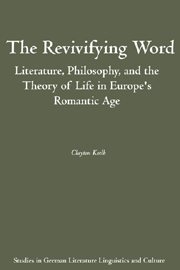Book contents
- Frontmatter
- Contents
- Preface
- Note on Abbreviations and Translations
- Part I Letter and Spirit
- Part II The Dead and Living Past
- Part III The Incarnate Word
- 7 “Eat This Scroll”: Kleist's “Michael Kohlhaas”
- 8 “I Sickened as I Read”: Mary Shelley's Frankenstein
- 9 “Those Who, Being Dead, Are Yet Alive”: Maturin's Melmoth the Wanderer
- 10 “This Hideous Drama of Revivification”: Poe and the Rhetoric of Terror
- Conclusion
- Works Cited
- Index
7 - “Eat This Scroll”: Kleist's “Michael Kohlhaas”
from Part III - The Incarnate Word
Published online by Cambridge University Press: 05 February 2013
- Frontmatter
- Contents
- Preface
- Note on Abbreviations and Translations
- Part I Letter and Spirit
- Part II The Dead and Living Past
- Part III The Incarnate Word
- 7 “Eat This Scroll”: Kleist's “Michael Kohlhaas”
- 8 “I Sickened as I Read”: Mary Shelley's Frankenstein
- 9 “Those Who, Being Dead, Are Yet Alive”: Maturin's Melmoth the Wanderer
- 10 “This Hideous Drama of Revivification”: Poe and the Rhetoric of Terror
- Conclusion
- Works Cited
- Index
Summary
ROMANTIC PROTAGONISTS NOT ONLY REVIVED the dead past by reading; they also often achieved spiritual revivification by incorporating texts into their physical bodies. We have seen how Goethe's character Werther seeks to make himself one with a set of texts, principally the poems of Homer and “Ossian.” He reads his way into these texts so thoroughly that he seems to have consumed them, and indeed at times he even appears to have figuratively eaten his way into them. The merger of self and text, both wished for and dreaded by Romantic protagonists, is also inevitably a crossing of the border between life and death. Werther, Claude Frollo in Victor Hugo's Notre-Dame de Paris, and even Keats's Endymion all traverse this boundary or reside in its immediate vicinity. They are primarily concerned with the recovery, recuperation, and revivification of the past. Other figures, like Mary Shelley's Frankenstein (along with his demonic creature) and many of Poe's characters, are more urgently concerned with the closely related pleasures and terrors that accompany transforming the dead word into living flesh. One of the most interesting of these protagonists is the title character of Heinrich von Kleist's story “Michael Kohlhaas” (1810).
Kleist's famous tale is both one of the most admired and one of the most frequently censured works in the modern German canon. There is nearly universal admiration for the story of Kohlhaas's attempt to obtain redress for an injustice done to him by the Tronka family, for his excesses in taking the law into his own hands, and for his final vindication for the former and condemnation for the latter.
- Type
- Chapter
- Information
- The Revivifying WordLiterature, Philosophy, and the Theory of Life in Europe's Romantic Age, pp. 113 - 126Publisher: Boydell & BrewerPrint publication year: 2008



